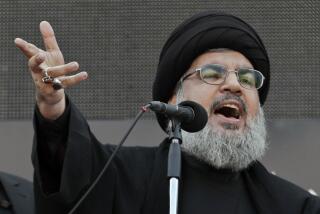Hezbollah cheers return of prisoners
BEIRUT — Hezbollah leader Sheik Hassan Nasrallah on Wednesday warmly welcomed the five Lebanese men who were released from Israeli custody in exchange for the bodies of two Israeli soldiers.
Nasrallah embraced Samir Kuntar, the most notorious Lebanese convict held by Israel, who was returning to Lebanon after 29 years in jail. He then hugged the four other fighters released with Kuntar in a swap approved by Israel’s Cabinet on Tuesday.
“The time of defeats has gone and the time of victories has come,” Nasrallah, who rarely appears in public, said to a crowd of thousands gathered in south Beirut.
As Israelis mourned the two soldiers whose bodies were returned to their country, Hezbollah leaders and followers celebrated what they described as a huge triumph for the Shiite Muslim militant group.
Nasrallah’s appearance was cheered by the crowd of Hezbollah supporters who gathered for a ceremony in honor of the released fighters, many of them carrying yellow flags and photos of the men. Some raised their fists in the air, chanting their allegiance to Nasrallah. Others took photos of him with their cellphones.
“This is a big national celebration,” Nasrallah said in a speech. “The real identity of the people of our region . . . is the identity of the resistance and its will and its culture.”
Nasrallah criticized those who accused him of dragging the country into a war two summers ago.
“The main element that made us reach [our goal] is steadfastness and victory in the face of the 2006 aggression, and the enemy’s failure to reach any of its goals,” he said.
Behind the podium was a picture of a raised fist, symbolizing Hezbollah’s fight against Israel, and posters reading, “God’s achievement by our hands,” “The first manifestations of victory,” and “We are people who don’t leave their prisoners.”
Hezbollah captured the two Israeli soldiers in a July 2006 cross-border raid that sparked a monthlong war that devastated large swaths of Lebanon. The group had wanted to seize soldiers to bargain for the release of Kuntar, who was serving life sentences, and other Lebanese prisoners.
In 1979, Kuntar, who was 16, was part of a cell that raided the Israeli town of Nahariya, fatally shooting a policeman and later a civilian in front of his daughter. The girl was then killed by a rifle-butt blow to the head.
On Wednesday, thousands took to the streets in south Beirut to greet the returning prisoners. Hezbollah’s Al Manar television aired clips with songs celebrating the victory of the insurgency. Commentators spoke about Israel’s “fragility” after this major victory.
Women threw rose petals and rice at the convoys of the returning prisoners, who waved to the crowds.
On the podium, a band performed military songs before the five freed prisoners made a theatrical entry, breaking a series of mock bars representing their release from jail.
Many in the crowd waved the flags of Palestinian and leftist groups in a show of support for some of the 199 fighters killed in clashes over the years whose remains were repatriated as part of the swap.
Despite leading a Shiite movement, Nasrallah sought to appeal to Sunni Arabs across the region by addressing rich Arab states with relations with the U.S. and urging them to work on the release of the thousands of Palestinians in Israeli jails. He noted that under the swap arrangement, Israel is committed to releasing some Palestinian prisoners.
Earlier in the day, the prisoners arrived by helicopter at Beirut’s airport from the Naqoura border point where they had been released. At the airport, a ceremony was held to honor their return in the presence of the newly elected president of the U.S.-backed government and politicians from all political groups.
Kuntar’s mother watched calmly as her son returned to Lebanon.
“I want to congratulate him for his safety,” she told Al Manar. “My dream is to see him.”
The swap Wednesday coincided with the first Cabinet meeting of Lebanon’s new government, in which Hezbollah and its allies have the power to veto major decisions, including any attempt to disarm the militant group. Hezbollah and its supporters have grown increasingly confident in both their domestic political abilities and military prowess.
More to Read
Sign up for Essential California
The most important California stories and recommendations in your inbox every morning.
You may occasionally receive promotional content from the Los Angeles Times.










